SKMS 30년…위기에 강한 기업 문화로 '진화'
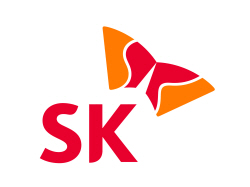
최근 미국 애리조나 피닉스에 위치한 글로벌 경영전문대학원(MBA)으로 유명한 선더버드스쿨(Thunderbird school of Global Management)의 기업경영 전문 교수인 캐넌 라마스와미(Kanan Ramaswamy) 교수가 SK그룹의 고유 경영기법인 SKMS(SK경영체제)를 분석해 화제가 되고 있다.
라마스와미 교수는 동서양의 제너럴일렉트로닉(GE)같은 대기업부터 잘 알려지지 않은 중소기업의 경영전략, 기업문화 연구 등으로 학계에 잘 알려진 교수다. 그 동안 SKMS가 국내 경영학 교수들로부터 호평 받은 적은 많지만, 외국의 저명교수가 이를 높이 평가하고 사보에까지 기고문을 실은 것은 이번이 처음이다.
그는 "세계기업들이 오일쇼크에서 오직 생존만을 생각했던 30년 전, 고(故) 최종현 회장은 SK만의 경영원칙과 시스템의 필요성에 주목했다"면서 "서구 기업의 성공을 모방한 시스템이 아닌 한국기업만의 독특한 문화가 녹아든 경영법이라는 점에서 SKMS는 가치가 더한다"고 말했다.
세계적으로 성공한 기업들의 최대 공통점은 각 기업별로 독특한 경영법과 기업문화가 있다는 것. 기업이 위기와 고난을 거치며 진화할 때 그 힘을 발휘하기 때문이다.
이어 라마스와미 교수는 SKMS가 ▲의사결정을 위한 로드맵으로서의 원칙 ▲세대를 넘어 계승되는 살아있는 가치 ▲글로벌리제이션에 필요한 가치통일 등을 제시했다는 점에서 다른 기업문화와 차별된다고 강조했다.

그는 "SKMS는 많은 기업들이 인재 경영에 주목하기 시작한 훨씬 이전부터 '인간 중심의 경영'을 제시했다"고 강조했다.
우리나라에서 대표적인 기업문화로 꼽히고 있는 SK그룹의 SKMS는 올해로 만들어진 지 만 30년을 맞았다. 1979년 당시 2차 석유 파동으로 모든 기업들이 하루 하루 부도를 맞는데 온 힘을 쏟고 있을 때 SK그룹은 '오늘의 위기보다 내일의 성장이 더 중요하다'며 경영법을 만들었던 것이다.
최종현 회장은 "2000년대에 가면 SK는세계적 수준의 일류 기업이 돼야 하며, 이를 위해 경영관리 수준과 사람의 수준이 세계적으로 일류로 만들기 위한 경영법이 필요하다"며 "SK가 어떤 위기에서도 발전하기 위해서는 반드시 강한 기업 문화가 있어야 한다"면서 구성원들을 설득했다.
그 결과, SK그룹은 물론 재계와 학계에서 수원의 소기업에서 시작한 선경그룹이 오늘날 재계 3위, 글로벌 86위 기업으로 성장한 배경으로 주저없이 SKMS를 꼽는다.
◆SKMS는 왜 나왔나?
고 최종현 회장은 1975년 글로벌 기업으로 가기 위한 전초기지로 '경영기획실'을 만들고 첫 구상으로 기업경영에서 설비 경쟁의 시대는 지났고, 1970년대부터는 '경영 전쟁 시대'라고 신년사를 통해 발표했다.
최종현 회장은 "대부분의 경영관련 지식이나 원칙이 서양의 경영학에서 나온 것으로 한국적인 토양에 일괄적으로 적용하기 어렵기 때문에 한국적이면서도 SK만의 독특한 경영법을 정립해야 한다"고 설명했다.
그리고 ▲사업적인 측면에서는 '석유에서 섬유까지' 수직 계열화를 목표로 ▲경영적인 측면으로는 국제적 기업으로서 손색없는 경영능력을 갖춰야 한다는 두 가지 명제를 발표하게 된다.
이와 함께 ▲인간위주의 경영 ▲합리적인 경영 ▲현실을 인식하는 경영 등 3대 경영 이념을 SK경영법의 핵심 축으로 제시했다.
최종현 회장은 이에 따라 당시 경영기획실을 중심으로 TF를 구성, 4년동안 SKMS를 개발한 뒤 1979년 3월 서울 수유리 아카데미하우스에 전 임원들이 참석한 가운데 이를 발표한다.
이 때 발표된 SKMS는 기업 경영의 조건이 기업의 영구·존속·발전에 있고 그 주체는 '사람'이며 때문에 회사의 발전은 개개인 발전으로 직결된다는 점을 분명히 규정했다.
또 ▲왜 기업을 경영하는지 ▲어떻게 기업을 경영 하는지에 대해 기업관, 기업 경영 정의, 목표, 원칙 등의 규정을 내리고, 기업 경영의 모든 프로세스를 기획, 조직, 생산 등 11개로 나눠 각각의 개념과 필요성 및 일처리 방법 등을 정리했다.
특히 최종현 회장은 '일의 수준을 결정하는 것은 사람'이라는 점에 주목해 당시 경영학 등에서 등한시했던 일하는 사람의 의욕과 역량을 높여 주는 것이 절대적으로 중요하다고 보고 SKMS의 주요한 요소로 의욕관리, 역량관리 등 5가지를 제시했다.
1989년 최종현 회장은 개념적이고 이론적인 측면의 SKMS를 구체적으로 실행하는 방안으로 수펙스 추구법을 개발했다.
당시 세계적인 일류 기업을 지향한 SK그룹은 세계적 기업들을 따라 잡기 위해서는 통상의 목표 수준을 설정해서는 불가능 하다고 판단하고 한단계 높은 수준의 목표를 설정하는 것이 중요하다는 결론을 내렸다.
즉, 기업 경영의 목표를 베리 굿(Very Good), 엑설런트(Excellent), 수퍼 엑설런트(Super Excellent)의 3단계로 구분하고, 선진 기업들이 Very Good 또는 Excellent 수준의 목표를 설정하기 때문에 SK는 한 단계높은 목표를 세워야 한다는 차원에서 '인간의 능력으로 도달할 수 있는 최상의 수준'인 'Super Excellent'로 설정키로 했다. 여기에서 나온 용어가 바로 수펙스(SUPEX)다.
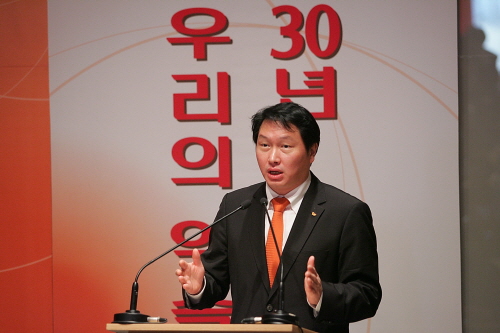
◆SKMS 가치 증명
SKMS를 처음 시행하던 지난 1979년의 SK그룹은 SK케미칼, ㈜선경 등을 주력 사업으로 하는 매출 1조원 안팎의 중견 기업에 불과했다. 올해 SKMS 정립 30주년이 된 SK그룹은 지난해 기준으로 매출 100조원 돌파, 에너지 수출 비중 50% 돌파 등 괄목할 만한 성장을 했다.
SKMS를 정립한 SK그룹은 그 이듬해인 1980년 '석유에서 섬유까지'라는 사업계획에 따라 폴리에서트 사업진출 이후 숙원사업이던 석유사업에 성공적으로 진출하게 된다.
뿐만 아니라 1989년 SKMS의 구체적인 실천 방안으로 수펙스를 제시한 뒤 사업권 선정과 반납이라는 수많은 난관 속에서도 정보통신 사업에 진출할 수 있었던 것도 SKMS와 수펙스가 있었기 때문이라는 게 SK그룹측의 설명이다.
또 인수 이후 사업을 성공적으로 키워 나갈 수 있었떤 것도 모든 구성원을 하나로 연결시켜주는 기업문화이자 커뮤니케이션 수단으로서 SKMS가 있었다는 것.
하영원 서강대 교수와 김진교 서울대 교수는 'SKMS와 성과 간 관계"라는 논문을 통해 "SK 구성원들에게 전파, 공유되고 있는 SKMS가 실제로 SK그룹의 성과에 긍정적인 공헌을 해 왔다"고 밝혔다.
이경묵 서울대 교수는 SKMS를 "조직 요소간의 유기적 연계와 환경 변화에 대한 동태적 대응이라는 외형적인 짜임은 물론 그에 맞게 실행방법을 잘 설계해둔, 세계적으로 높이 평가받을 수 있는 시스템 경영의 교재나 다름없다"고 평가했다.
◆SKMS의 끝없는 진화
SK그룹은 1979년 정립 이후 지난해 5월의 12차 개정까지 경영환경 변화를 SKMS에 반영한데 이어 국내 기업 최초의 '경영법 연구소'인 SKMS 연구소를 지난해 열었다.
최태원 회장은 최근 SKMS 30주년과 관련해 "SKMS 30년은 SK의 생명력이고, SK의 생명력은 SKMS에서 나온다"고 말한 뒤 "기업의 영속적인 발전을 위해 생명력을 강화시켜 나가야 하며 이는 SKMS가 진화해야 한다는 의미"라고 강조한 바 있다.
최태원 회장은 특히 "SKMS를 정립하던 1979년과 30년이 된 올해 공교롭게도 경제적으로 많은 고통을 받고 있는 시기"라며 "SKMS를 근간으로 전구성원이 한마음 한뜻으로 위기를 극복해 나가자"고 당부했다.
SK그룹은 이에 따라 SKMS 연구소를 중심으로 SKMS의 핵심철학은 유지 강화하는 한편 ▲글로벌 버전의 SKMS ▲각 관계사별 그리고 사업 단위, 팀 단위의 SKMS 실천법 등으로 SKMS를 다양화 시켜 나갈 계획이다.
Secret of Growth for 100 Trillion for SK
SKMS/Focusing on 'SKMS',the management system reaching its 30th anniversary
'SKMS (SK Management System)', which has been the ‘blue print’ for SK Group to grow into a company with 100 trillion won of sales, had its 30th anniversary. SKMS is the management system that specifies the corporate vision and culture of SK. It may be considered as the ‘SK Manual’ that defined the view on corporate operations for SK as well as its definition, goal and principle of corporate management of SK. And it further specifies its concept, need, work process method and others in each process of planning, organizing, production and others. The late Chairman Jong-hyun Chey organized a task force with the Office of Executive Planning leading the way, and it was formulated after 4 years of R&D process, and it was presented at ‘Suyu-ri Academy House’ on March 31, 1979. It has the foundation of ‘human-oriented management vision’ of late Chairman Jong-hyun Chey that ‘it is people that determines the level of work undertaken'. CEO Cheol-gil Jung of SK C&C Public and Financial Business Division says that, "the core part of SKMS can be defined in one word, 'human', and its vision as the root remains the same while its leaf in practice has been advanced to meet the reality and steadily advanced even in the present day." SK provides the SKMS-related lectures at the training of new employees for a week and the officers and employees who are promoted also are provided with the education as well. Entire affiliated companies have the employees to pass the SKMS test to advance into higher ranking positions. An official at SK stated that, "SKMS has taken a great role to settle down the challenging, systematic, reasonable and human value in corporate culture", and added that, "it has been a driving force in integrating the constituents each time the corporate size gets larger and diversifies the business in its 50 years of history." Honorary professor at College of Economy in of Seoul National University, Byung-rak Song, is famous for his studies in Korean-style management system, and he assessed that "Astonishing advancement from a small textile plant to a company with the revenue of 100 trillion won reflects the value of SKMS that encompasses the corporate culture as well as its management approach, system, and strategy to the fullest."
◆ Core part of SK growth, 'SKMS' = The power of SKMS was displayed clearly when acquiring Yugong (current SK Energy) and Korea Telecomm (current SK Telecomm). Former president Ro-jong Lee of SK Academy said that, "the first thing that the company did while acquiring Yugong was to implement SKMS training for officers and employees of Yugong", and added that, "it was the decision to go only one direction from the way of thinking to have SK and Yugong as one family." In addition, he further stated that, "after the acquisition, Yugong had its plant extended from one plant to four plants and completed the combinite plant in 10 years", and added that, "this type of effect was proven after the acquisition of Korea Telecomm as well." In fact, SK considers that the ‘SUPEX’ spirit of SKMS that would pursue the ‘highest level to reach within the capability of human’ is largely responsible for the legend of SK Telecomm through creating CDMA commercialization for the first time in the world. Professor Young-won Ha of Seokang University and Professor Jin-gyo Kim of Seoul National University (College of Business) have analyzed the total revenue of SK Group for 27 years, from 1980 to 2007, and announced the result evaluated in monetary terms for the progress and advancement of SKMS towards the outcome of the group. Professor Ha and others indicated that, "looking at the performance since 2000 when the 'SUPEX' concept was fully introduced, SKMS has contributed revenue of 6.779 trillion won on an annual average and 440 billion won of profit generation on an annual average.”
◆ Driving force to overcome the crisis, 'SKMS' = SK Group held a special event at ‘SKMS Research Center’ in Icheon, Gyeonggi-do, on the 31st of last month with all CEOs of affiliated companies. The occasion was to celebrate the 30th anniversary of SKMS. Chairman Chey, Tae-won said that "30 years of SKMS has been the vital source of SK, and the vitality of SK comes from SKMS", and added that, "for the perpetual advancement of the company, its vitality has to be strengthened and it implies that SKMS has to evolve." Furthermore, he emphasized that "it is coincidental that the year of establishing SKMS in 1979 and this year with its 30th anniversary have seen us encounter great economic suffering, and it is time for us to unify all our constituents to overcome this crisis." An official of SK indicated that the company would maintain its core philosophy of SKMS on the basis of its SKMS research center along with the diversification of pertinent concepts with the global version of SKMS and practice of SKMS for each affiliated company, business unit, and team unit.


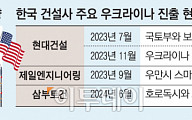


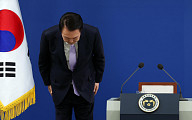
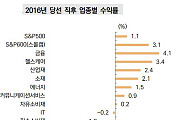




![요즘 가요계선 '역주행'이 대세?…윤수일 '아파트'→키오프 '이글루'까지 [이슈크래커]](https://img.etoday.co.kr/crop/320/200/2099221.jpg)